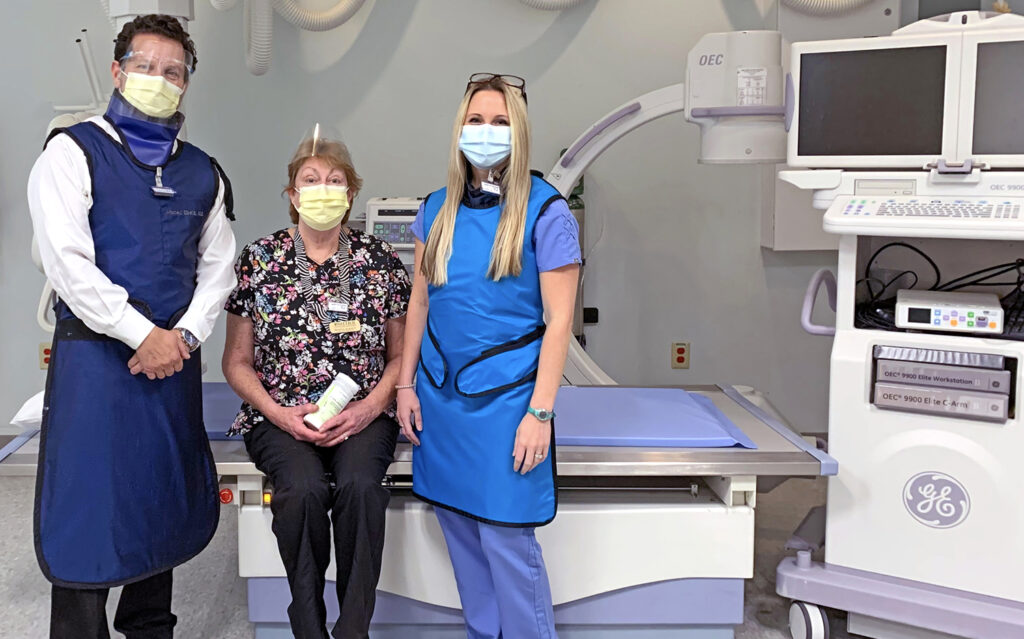Whittier Health Network
Speech Therapy
Whittier’s dedicated Speech-Language Pathologists (SLPs), also called Speech Therapists (STs), determine the safest and least restrictive diet for patients with trouble swallowing, a common problem for people recovering from a debilitating illness such as a stroke. SLPs teach strategies to improve chewing and swallowing and assist people with relearning communication skills and help improve their cognitive skills.
Speech-Language Pathologists improve lives
According to the American Speech-Language-Hearing Association (ASHA), Speech-Language Pathologists “prevent, assess, diagnose, and treat speech, language, social communication, cognitive-communication, and swallowing disorders in children and adults.”
Speech Therapy at Whittier Health
 If a patient demonstrates difficulty swallowing, difficulty communicating, or impaired cognitive skills, a cognitive-communication or swallowing evaluation is ordered by one of the medical staff for a licensed speech-language pathologist to evaluate the patient and provide treatment as warranted. Speech-language pathologists collaborate with professionals in other disciplines to ensure that every patient reaches their highest level of function and independence during their stay.
If a patient demonstrates difficulty swallowing, difficulty communicating, or impaired cognitive skills, a cognitive-communication or swallowing evaluation is ordered by one of the medical staff for a licensed speech-language pathologist to evaluate the patient and provide treatment as warranted. Speech-language pathologists collaborate with professionals in other disciplines to ensure that every patient reaches their highest level of function and independence during their stay.
Whittier’s dedicated Speech-Language Pathologists (SLPs), also called Speech Therapists (STs), determine the safest and least restrictive diet for patients with trouble swallowing, a common problem for people recovering from a debilitating illness such as a stroke. SLPs teach strategies to improve chewing and swallowing and assist people with relearning communication skills and help improve their cognitive skills.
Speech Therapy supports overall health outcomes
Inpatient care emphasizes the vital connection between Speech-Language Pathologists (SLP) and Registered Dietitians (RDs). Every client admitted to one of Whittier’s inpatient facilities is seen by an RD conducting interviews and reviewing diagnoses. Dietary recommendations are based on allergies, preferences, cultural factors, and metabolic and nutritional needs; a therapeutic diet is prescribed for medical conditions like malnutrition, heart disease, or diabetes and is crucial for healing complex wounds.
Whittier’s SLPs thoroughly evaluate the patient’s ability to swallow foods and liquids safely. While the RD guides the type of diet, it falls to the SLP to ensure that the patient can safely consume their recommended diet. Observations during evaluations and information gathered from patients’ families and their medical history guide the SLP’s treatment goals. The SLP assesses each patient to visualize any physical deficits which impair normal swallowing. Further studies, such as a modified barium swallow studies (MBSS), may be indicated. At Whittier, this is an interdisciplinary test conducted by the SLP, a physician, and a radiology technician in our radiology suite. During this procedure, a real-time X-ray tracks the movement of different consistencies and viscosities of foods and liquids mixed with barium to help clinicians identify the etiology of the impairment, determine the safest and least restrictive diet, and help tailor a patient’s treatment goals. Some of our high-risk patients are those with neurologic diseases, throat, and oral cancers, who are weaning off a feeding tube, and who recently removed a breathing tube.
Treatment Strategies
The SLP orders the least restrictive but safest food and liquid consistencies to reduce the risk of food and/or liquids entering the patient’s lungs (aspiration pneumonia). Patients with impaired swallowing (dysphagia) are taught compensatory strategies to enhance oral intake while reducing the risk of injury and illness.
The speech-language pathologist may order the therapeutic diet to be prepared with an altered consistency for these patients. “Altered consistency” means foods that have been modified in texture or thickened liquids. Over time, and with regular treatments, the patient’s ability to swallow safely will generally improve. The SLP may upgrade the consistency of foods and/or liquids based on the patient’s progress while maintaining health and safety.
Enhancing communication and quality of life
The goals of the SLP in rehabilitation or long-term care facility settings are typical to rehabilitate the patient to their prior level of function. Whittier’s SLPs use best practice guidelines for individual treatment and continuing education to stay current with ever-evolving speech, language, and swallowing research. Whittier’s speech-language pathologists educate the patient, family, and care team on individualized methods to optimize communication and ensure the patients receive the best care. Alternate methods that assist in communication can be as simple as a picture or word bank or writing on a whiteboard; they may also employ more advanced techniques for communication, like computer-based technology, when necessary.
In addition to swallowing and communication, SLPs develop goals and strategies to improve cognitive deficits in their patients. After a significant medical event, patients may have to relearn daily cognitive tasks such as telling time, paying bills, or following multi-step directions. Whittier’s speech-language pathologists are some of the best in their field, always striving to improve the quality of life for every patient.

